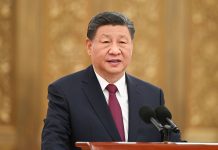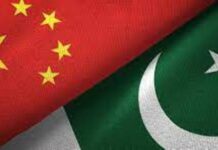
Brazilian scholar Filipe Porto is looking forward to a stint in Beijing. Porto, a researcher at Brazil’s Federal University of ABC, is considered a young China hand.
Porto visited China in June as part of the 2023 Future Close-Up, a program taking young global representatives around the nation to gain an in-depth understanding of its achievements in developing its digital economy. During the trip, he met with Li Yafang, President of China International Communications Group (CICG) Center for the Americas. At the meeting, Li invited Porto to the Second China-Brazil Forum for Exchange and Mutual Learning, which took place in São Paulo, Brazil, on September 16.
Themed New Consensus, New Cooperation, New Future, the forum was cohosted by the CICG Center for Americas and Brazil’s Fundação Getúlio Vargas (Getulio Vargas Foundation), a higher education institution and think tank.
Porto told Beijing Review that he was touched by the invitation. He presented a report about Brazilian and Chinese Gen Z perceptions of the two countries on cultural matters at the forum, together with Wei Mingxin, a reporter with China Hoje, a Portuguese-language digital monthly magazine published by the CICG Center for Americas. The center is also the publisher of Beijing Review.
According to the report, members of Gen Z in China and Brazil have a high demand for and proactive attitude toward learning about each other’s cultures. Young people in both countries see great potential in broadening and deepening China-Brazil cultural exchange in the future, the report said.
“I hope that I can effectively communicate between both countries. It will not only help me to tell China’s story well, it will also be an opportunity to tell Brazil’s story to China. I can’t wait until it starts,” Porto said, adding he is in the process of preparing to take up an editorial position at China Hoje.
People-to-people exchange
Participants in the forum called for more cultural and people-to-people exchange.
When people talk about China-Brazil relations, they often focus on economic and trade cooperation because the achievements are significant, Vinicius Gurtler da Rosa, Coordinator of Multilateral Affairs and International Cooperation at the Ministry of Culture of Brazil, said at the forum. Cultural and people-to-people exchanges between the two countries are equally important, because they can further enhance bilateral relationship and enrich the comprehensive strategic partnership between the two countries, he added.
Despite the vast physical distance between China and Brazil, both sides have consistently shown mutual respect and appreciation for each other, Chinese Ambassador to Brazil Zhu Qingqiao said at the forum via video link. In recent years, people-to-people exchange between the two countries has increased and mutual understanding between the two peoples has continued to deepen, Zhu added.
According to Luís Antônio Paulino, Director of the Confucius Institute at São Paulo State University, in the past 15 years, the institute has promoted cultural exchange between China and Brazil, with about 600 of its students having studied in China. The institute has also translated many Chinese cultural classics and literary works and published them in Brazil, among them are The Analects of Confucius and the Dao De Jing, he told the forum. Confucius Institutes, named after the ancient Chinese philosopher Confucius (551-479 B.C.), are nonprofit public institutions that help people around the world better understand China by teaching Chinese language and culture at universities in their host countries. The Confucius Institute at São Paulo, founded in 2008, is the first of its kind in Brazil.
However, there are still many Brazilians who lack understanding of Chinese culture and values, and both countries need to leverage media collaboration to introduce China’s 5,000-year history, Phillip Lucas, International Editor of news program Jornal da Band, said at the forum.
While there have been significant achievements in economic and trade relations, the next step should involve broader and deeper cultural cooperation, Lucas added.
Porto echoed Lucas’s views and called attention to China’s path toward modernization. He said he has visited China many times and seen progress including the air getting cleaner and the number of electric vehicles in the streets increasing. “This is inspiring. I hope more and more Brazilians could get to know China better and I am pretty sure they would feel the same as me,” Porto added.
China is willing to further enhance mutual learning with Brazil, and supports close dialogue and expanded cooperation between many sectors from both countries, including think tanks, universities, media, youth and civil organizations, and at the local level, Zhu added.
In recent decades, the National Art Museum of China (NAMOC) and Brazil’s National Museum of Fine Arts have conducted pragmatic cooperation and have jointly made a contribution to showcasing the cultural strength of BRICS countries and promoting mutual learning among civilizations, according to Wu Weishan, Director of the NAMOC, who attended the forum via video link. BRICS is a grouping bringing together five major emerging economies—Brazil, Russia, India, China and South Africa.
CICG Vice President Liu Dawei said at the forum that, at present, cultural exchange and mutual learning between China and Brazil are at their historical peak. The friendly, candid, pragmatic and cooperative political trust built on equality and respect between the Chinese and Brazilian governments has laid a solid foundation for cultural exchange between the two countries.
Deepening partnership
This year marks the 30th anniversary of the establishment of the strategic partnership between China and Brazil, and 2024 will mark the 50th anniversary of the establishment of diplomatic relations between the two countries.
For half a century, the tree of China-Brazil friendship has flourished and borne bountiful fruits as the two countries have adhered to the principles of equality, mutual benefit and win-win cooperation, Qiu Xiaoqi, Special Representative of the Chinese Government on Latin American Affairs, said at the forum via video link.
In his speech via video link, Marcos Bezerra Abbott Galvão, Brazilian Ambassador to China called on both nations to review their achievements and look forward to exploring deeper collaboration in a variety of areas.
China stands as the largest source of foreign investment in Brazil. It is also Brazil’s largest trading partner, with the latter running a bilateral trade surplus of $29 billion last year. Moreover, technological collaboration has yielded many results, such as the China-Brazil Earth Resources Satellite program. It is hoped that both nations will further deepen and broaden their cooperation, which is of great importance for Brazil’s development, Galvão said.
“China and Brazil are both major developing countries, possessing high growth vitality and development potential, and playing an important role in regional and international affairs. Whether in terms of mutual interests or the trends of the times, it is imperative that the two countries continuously seek to tap the potential for cooperation,” Li from the CICG Center for Americas said at the forum.
“This will not only align their bilateral relationship with their development goals but also drive South-South cooperation and cross-regional collaboration, contributing to global integration and international peace and development,” she concluded. –The Daily Mail-Beijing Review news exchange item




